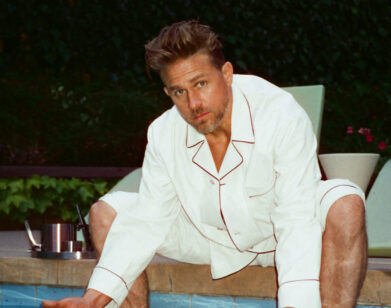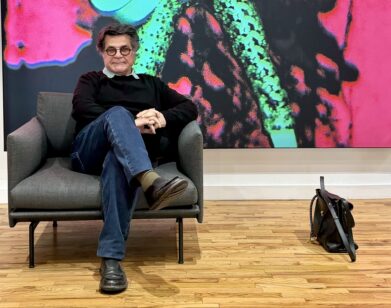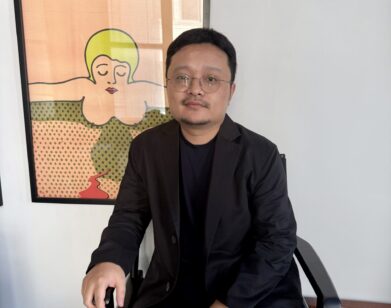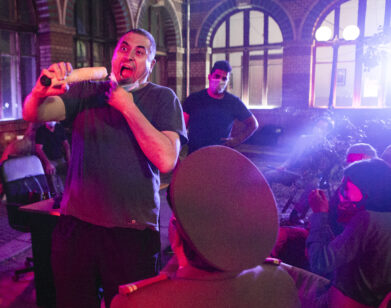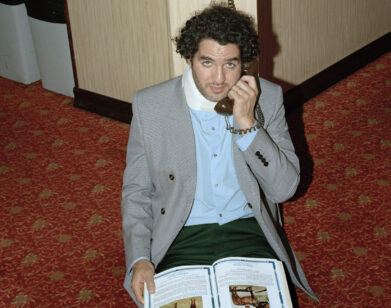James Marshâ??s Magical Realism
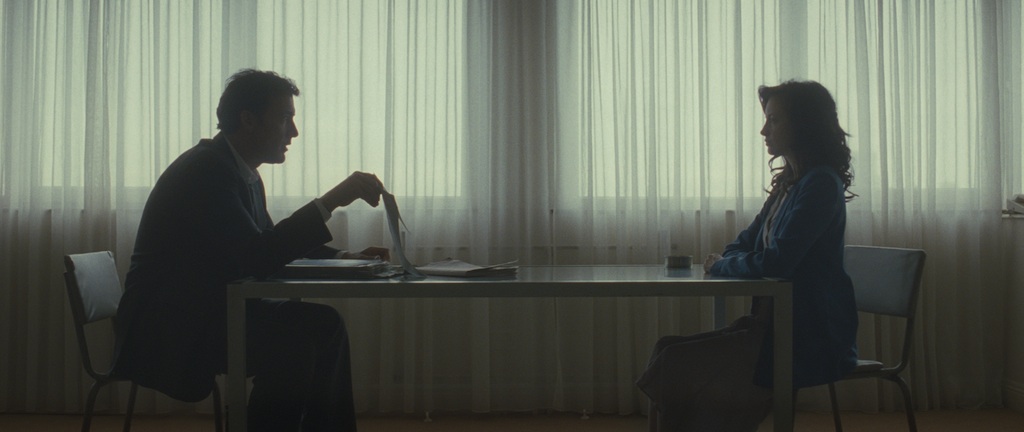
ABOVE: CLIVE OWEN AND ANDREA RISEBOROUGH IN SHADOW DANCER, COURTESY MAGNOLIA PICTURES
For James Marsh, the best stories, however outlandish or fantastical they may seem, are firmly rooted in reality. Born in Britain and based in Denmark, Marsh began his career working on TV documentaries for the BBC. In 2009, he won an Academy Award for his audacious heist-style documentary, Man on Wire, about tightrope walker Philippe Petit’s 1974 illegal high wire act between the two World Trade Center towers. Now, 50 Marsh consistently crafts films that viscerally delve into the human experience. His deft navigation between documentary and feature have inspired comparisons to Werner Herzog.
Marsh’s third narrative feature, Shadow Dancer, is no different. Set in Belfast in the early ’90s, the morose, slow-burning thriller eschews political intricacies and instead focuses on Collette McVeigh (an vulnerable and nuanced Andrea Riseborough), a single mother and member of an active-IRA family, who, after planting a bomb in a London Underground station, is intercepted by an MI5 officer, Mac. Played by Clive Owen, Mac gives Collette a choice—become an informant or go to prison and leave her son. Marked with little dialogue, the film is a stark entryway into Collette’s psychology. Supported by Owen and an ensemble cast that includes Gillian Anderson and Game of Thrones’ Aidan Gillen, Shadow Dancer climaxes as a volatile account of power, loyalty, deceit, and obligation.
Interview met with Marsh yesterday at the Crosby Street Hotel in New York to discuss his affinity for thrillers, documentaries versus features, and how fact can veer into the fantastical.
COLLEEN KELSEY: How did you become involved with this project? What about the script interested you?
JAMES MARSH: Well, the script came to me, and I knew its origins were in a novel that I hadn’t read and was dimly aware of. The novel was written by a political journalist in the U.K. who’d spent some time in Northern Ireland exactly around the time that the film and the book is set. I got the script, and what I read was much longer and more epic than we ended up shooting. The premise—what it would be like to be a mother and being offered this impossible bargain—that felt universal to me. It didn’t feel specific to that time and place; it felt like that’s a universal human predicament you can access. Every human conflict, I’m sure, involved traitors and informants, for whatever reason. And that was intriguing to me. But the script I got was really long and vastly too expansive. I knew that this kind of film couldn’t expect to do what the script was asking, so I then worked with Tom Bradby, the writer, on boiling it down to these very simple ideas, [and] focusing on Collette as our protagonist. The other thing worth saying is that that conflict was one that was very exhausting for everyone involved, and it had a big impact on the British mainland, as well as in Ireland. It felt like one of those things that everyone was just glad to be over with it. That said, it contained these kind of stories, and Tom’s script was very much informed by realism, by a familiarity of what really was going on there. I got intrigued by the premise, intrigued by the verisimilitude of the world, and then got to work on trying to make it producible and much more concentrated.
KELSEY: When you take on a documentary project versus a narrative feature like this, they both have their roots in reality. Is that something that you look for in a fictionalized project?
MARSH: I think you’re looking for something that feels truthful, and you can find that in quite fantastical ideas, as well—the truth of behavior. But certainly in this kind of story, it felt like the reality was one that had a big impact on what was going on with the characters and their choices. With documentaries, actually, my instinct is always to find stories that feel totally incredible—real life throws up stories and events, that, if you shape them in a certain kind of way, are almost unbelievable. It’s almost the opposite instinct with documentary, you look for something that you have to tell as factual, because if you did it as a fictional story, no one would really believe it. That’s true of Man on Wire and Project Nim, the last two documentaries I’ve made. They were just so incredible as stories that the best way as telling them was as they happened, in a documentary form.
KELSEY: Do you find in approaching a documentary versus approaching a narrative film that your process is different in crafting the structure of the film? Or do you approach them from a similar place?
MARSH: I think you approach them first as a storyteller. [For] a documentary, you’re looking to find that story in a mass of real information and you’re making a dramatic version of what really happened. That’s the process of making a documentary film—increasingly finding that story, that dramatic story in real life—whereas in a feature you’re usually given a script that has that shape already. The process of working on both is really quite different. The collaboration with actors is very different than it is when I’m doing with real people in documentaries. But the approach to it is generally the same, that you’re trying to get an actor to be safe and comfortable in the environment that you’re creating for them so they can do their work. That’s also true of people who would speak about their real experiences. Narrative is the big overlap between the two; certainly the work I do, is that idea of finding the narrative shape of something.
KELSEY: Do you find as a director you have more control when working with a documentary subject than with an actor in eliciting the performance you’re looking for?
MARSH: That’s an interesting question. Certainly in documentary, as a director, you have more ultimate control over the finished film, because it’s much more of a personal undertaking—it’s you making the film. In a feature, you have many important collaborators, not least actors. And my idea with actors is to let them do what they want, basically. It’s all in the casting; if you cast actors that you think are really good, you’re giving them a responsibility to take on the burden of the characterization. The actors I’ve worked with, certainly on this film, embrace that so wholeheartedly. You’re there to help that and to give them good circumstances, but ultimately it’s what they want to do with your input that you’re interested in, that’s why you cast them. With people that are telling you their real story, that involves a lot of time, usually, that you have to spend with them, way before you shoot anything, so they trust you and you listen patiently and ask the right kind of questions. You’re fishing for a story with people, and giving them a lot of space and time to tell that story, and it’s a big, vast, epic version, which you then hone down to a dramatic story, essentially.
KELSEY: How involved were you in the casting? I read that you wanted Clive [Owen] from the beginning.
MARSH: I wanted Clive from the moment I read the script. It’s one of those instincts that you have when you’re reading something that you put some people in it just to help you understand and help you make it real, in your mind. Clive was the first person I thought of because, firstly, he’s a really good actor, and he has a career that started out doing small films. I always knew he was a really good actor, and a very strong persona in a film. It was a really good collaboration; I really enjoyed working with him. Once I met with Andrea [Riseborough] and [had] seen some of her work, I knew that she would be a very interesting choice for this, and so it proved. We were very blessed with the supporting roles in the film. We had a great ensemble of Irish actors, too, who came to work with us. That’s the thing I’m most proud of in the film, is the performances and how well the actors work with each other, which is, again, what you hope to achieve as a director—to let the actors respond and react as a opposed to you directing them individually.
KELSEY: This films has similar characteristics to your others—Man on Wire, in particular. They all seem to have a thriller element. It feels that way to me, at least. There’s always suspense.
MARSH: Yes, there is. Well, hopefully. That’s certainly true of Man on Wire, which was framed in a genre way to be like that as a documentary, to be like a heist film. I guess those kinds of emotions are very much what a director can control, as filmmaker, and so it’s when you have to be very attentive to mood and atmosphere. Red Riding: In The Year Of Our Lord 1980 has a big element of that in it, as well. And the first film I made, The King, also has uncomfortable feelings of dread that grow as the film unfolds. So rather than go and see a psychiatrist about all this [laughs] maybe it’s a good idea to express those anxieties in a film.
KELSEY: Is there a new documentary subject that you’re interested in, or currently pursuing?
MARSH: I look every day for documentary subjects, and you only find the ones that you think you can do very rarely. But everyday you’re looking for that story. And they don’t come along so often. That, in a way, is almost harder to find than good screenplays. So I’ve had a project that I’ve worked on and shot some material for across the last two and a half years. I’m hoping [that], eventually, [it] will become a very unusual—formally very unusual—documentary film that’s based on a dream diary that I discovered. It’s a dramatization of a real love story as told through people’s dreams. It sounds very pretentious, and could be a total failure, but I’ve been working on that for two years, off and on. I’m always looking for that true story.
SHADOW DANCER IS OUT IN LIMITED RELEASE THIS FRIDAY, MAY 31.


